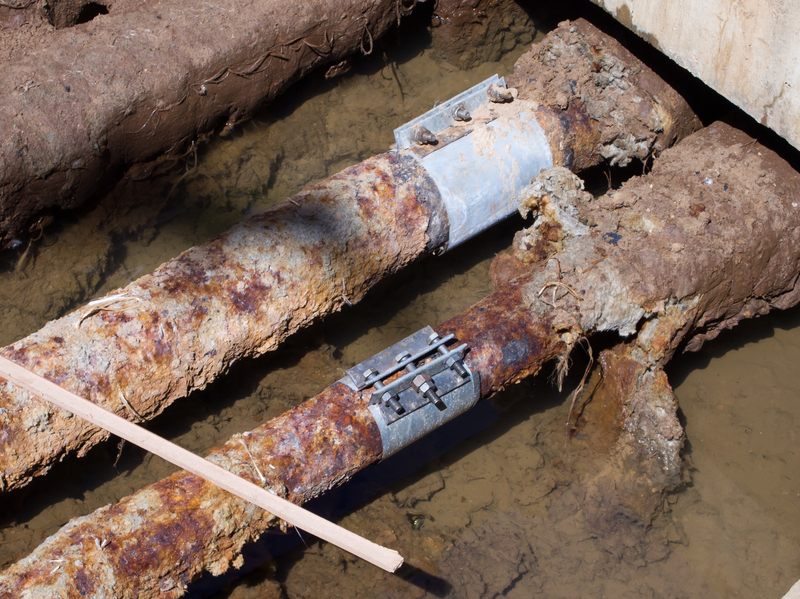Nebraska Materials and Ethics 7 PDH Discount Package 2
Courses in this Package
Pre-Coating Surface Preparation (T02-003)
Thermal Stress and Brittle Fracture of Material (T02-001)
An Introduction to Cathodic Protection (T02-004)
Ethical Issue: Deciding if Something is a Gift or a Bribe (LE1-007)

This online engineering PDH course describes surface preparation standards, common methods of surface preparation, and abrasive type and selection methods.
Surface preparation is the key factor in determining the success of a protective coating system. The equipment and techniques that can be used to achieve the desired surface cleanliness and roughness (profile) vary considerably. Traditional methods of surface preparation are now accompanied by new, innovative methods that have evolved mainly because of the issues surrounding the safe removal of lead-containing coatings from industrial structures. The ultimate objective of surface preparation is to create proper adhesion of a coating over an underlying substrate.
This 2 PDH online course is applicable to engineers, design and construction personnel, and other technical professionals who are interested in gaining a better understanding of surface preparation prior to coating applications.
This PE continuing education course is intended to provide you with the following specific knowledge and skills:
- Common methods of surface preparation
- Abrasive type and selection
- Surface preparation standards and specifications
In this professional engineering CEU course, you need to review Chapter 7 of the "Painting: New Construction and Maintenance" engineering manual, published by the United States Army of Corps of Engineers (USACE), Publication Number EM 1110-2-3400.
Upon successful completion of the quiz, print your Certificate of Completion instantly. (Note: if you are paying by check or money order, you will be able to print it after we receive your payment.) For your convenience, we will also email it to you. Please note that you can log in to your account at any time to access and print your Certificate of Completion.

This online engineering PDH course addresses the effects of thermal stress and thermal shock on a system. It explains how thermal stress and shock combined with pressure can cause major damage to components. This course also addresses ductile and brittle fracture. It describes how ductile and brittle fractures are affected by the minimum pressurization and temperature curves. It also explains the reason why heatup and cooldown rate limits are used when heating up or cooling down a system.
This 2 PDH online course is applicable to structural and mechanical engineers, construction and personnel, technical staff and facility operators who are interested in gaining a better understanding of thermal stress and brittle fracture of materials.
This PE continuing education course is intended to provide you with the following specific knowledge and skills:
- Thermal stress
- Pressurized thermal shock
- Brittle fracture mechanism
- Minimum pressurization-temperature curves
- Heatup and cooldown rate limits
In this professional engineering CEU course, you need to review Modules 3 and 4, "Thermal Stress and Brittle Fracture" of the Department of Energy Publication DOE-HDBK-1017/1-93, "Material Science".
Upon successful completion of the quiz, print your Certificate of Completion instantly. (Note: if you are paying by check or money order, you will be able to print it after we receive your payment.) For your convenience, we will also email it to you. Please note that you can log in to your account at any time to access and print your Certificate of Completion.

This online engineering PDH course provides an introduction to cathodic protection for underground structures such as tanks and pipelines. It covers the two principal methods used to mitigate corrosion: the sacrificial anode and impressed current systems. It introduces you to the nine steps in designing a sacrificial anode system, the thirteen steps in designing an impressed current system, and the field testing requirements needed for both.
This 2 PDH online course is intended for engineers and other construction professionals with a current or prospective need to understand the fundamentals of protecting underground structures such as tanks and pipelines from corrosion using sacrificial anode and impressed current cathodic protection systems.
This PE continuing education course is intended to provide you with the following specific knowledge and skills:
- Learn about the site testing requirements needed to design cathodic protection systems
- Learn how to calculate current requirements based on coating efficiency and current density
- Learn about the nine steps in designing a sacrificial anode system
- Learn about the thirteen steps in designing an impressed current system
- Learn how to calculate the number of anodes needed in both sacrificial anode and impressed current systems
- Learn how to calculate system life expectancy for sacrificial anode systems
- Learn how to calculate rectifier voltage for impressed current systems
In this professional engineering CEU course, you need to review the course document titled, "An Introduction to Cathodic Protection".
Upon successful completion of the quiz, print your Certificate of Completion instantly. (Note: if you are paying by check or money order, you will be able to print it after we receive your payment.) For your convenience, we will also email it to you. Please note that you can log in to your account at any time to access and print your Certificate of Completion.

This online engineering PDH course will establish, through the presentation of many examples, the principles of distinguishing between a gift and a bribe.
The federal government has formulated detailed rules covering gifts given to executive-branch employees in many situations. The rules are published in the Code of Federal Regulations (CFR) and are illustrated through many examples. Even though the examples are intended for government employees (many of whom are engineers), they also apply to private-sector engineers in similar situations. This course presents selected CFR examples that furnish guidance on the ethics of gift giving in situations that are especially relevant to engineers.
This 1 PDH online course is intended for engineers seeking guidance on distinguishing between ethical gift-giving and bribery.
This PE continuing education course is intended to provide you with the following specific knowledge and skills:
- Familiarizing with definitions of a bribe and a gift
- Knowing the bribe status of a gift based on a personal relationship
- Understanding the conditions under which gifts to spouses are acceptable
- Knowing the need to avoid even the appearance of a gift being a bribe
- Recognizing when gifts involving free attendance at meetings and conferences are acceptable
- Understanding the importance of the cumulative effect of receiving even small gifts on a periodic basis
- Learning the importance of gifts received when on assignment rather than outside of work
Upon successful completion of the quiz, print your Certificate of Completion instantly. (Note: if you are paying by check or money order, you will be able to print it after we receive your payment.) For your convenience, we will also email it to you. Please note that you can log in to your account at any time to access and print your Certificate of Completion.